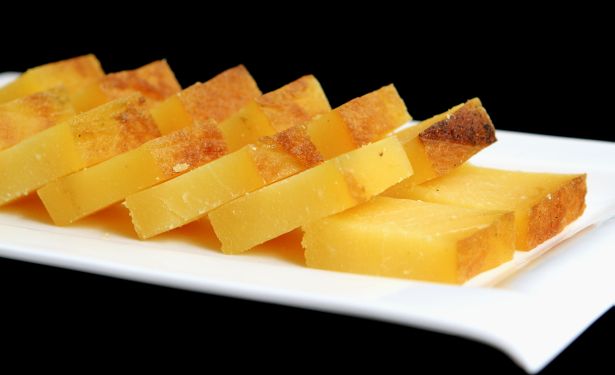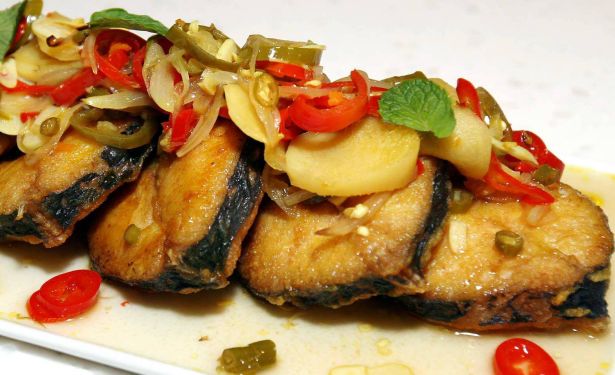IT is the norm of most businesses to increase the price of their goods and services following hikes in fuel and sugar prices as well as the enforcement of the minimum wage policy.
The proposed implementation of the Goods and Services Tax (GST) in April 2015 is also another factor adding to this.
Surprisingly (or perhaps, not quite), even trades that are not affected by the Governments move of reducing the sugar subsidy are also jumping in the bandwagon to revise their price tags.
At Cafe Ind, however, the management is doing just the opposite. Instead of upping the prices of its menu items like other eateries, the restaurant with its catchy tagline Now Everyone Can Eat, is in fact lowering them.
Located at Lorong Lai Chee, behind Bank Simpanan National in the centre of Sibu town, the cozy cafe is owned and operated by Peter Tang.
On the bold business move, he said they were able to just that due to their good business practices, including minimising operation costs such as rental and utility bills.
Undoubtedly the price increase in sugar and petrol are hitting most businesses hard. As a result of higher spending on operations, they have no choice but to pass the extra costs on consumers. For us, however, we are lowering our prices despite our cost of operations going up by 20%.
Notwithstanding, the move does not compromise the quantity and quality of our food and beverages, as well as our services. Were not even downsizing our staff, he told The Star.
Elaborating further, Tang said the objective was to show their appreciation to ongoing support given by regular customers.
At the same time, it serves to welcome new customers especially with our coming second anniversary celebration as well as the year-end and early 2014 festive season.
Always a positive man, Tang also believed that the move would very much help the company during this period of economic slowdown.
Adding on, he said Cafe Ind was certified halal by the Malaysian Islamic Development Department (Jakim) three months ago. Since then, he said, the restaurant had become a meeting place for people of all backgrounds to dine together; thereby helping to strengthen the existing harmony in the state.
On food, Tang said everything was prepared in the strictest hygienic condition as possible in accordance with the regulations. His chefs and service staff had also undergone food handling training conducted by ThinkBig Consultancy, a body certified by Jakim.
The restaurant had also introduced seven new items to its menu selection of 60 to 70 dishes.
The new offerings are Chicken Egg Roll, Dendeng Balado Sapi, Fried Meehoon, Nasi Uduk, Lumpia (Indonesian Spring roll) and Tom Yum Soup.
The meehoon, egg roll and lumpia actually derive from Chinese food. We are introducing due to popular request from our Muslim customers, Tang said.
The Dendeng Balado Sapi is a specialty of Padang, Indonesia. The beef for this dish is specially imported from Australia. It is thinly sliced, then boiled before being fried with shallots, chillies, lime juice and other ingredients.
The dendeng is served with seasonal mixed vegetables and omelette.
The Fried Meehoon is prepared Balinese-style, in which the stringy rice vermicelli is stir-fried with chicken meat, prawns, eggs, bean sprouts and capsicums, all flavoured with special Indonesian curry mix.
Another must try is Nasi Uduk which according to Tang, is only available in Cafe Indi. The name literally means mixed rice in Javanese. Locally, it is known as nasi lemak. To prepare the dish, the rice is steamed in coconut milk together with cloves, cassia bark and lemongrass. It is then served with omelette, pressured-cooked fried chicken drumstick, crispy local anchovies with peanuts, cucumber slices, fried ikan masin (salted fish) and tofu.
Meanwhile the lumpia is prepared Surabaya-style filled with fresh chicken, beng kuang (local turnip) and egg before being deep-fried to golden perfection and served with a special sweet chilli sauce.
Most of the spices used in the cafe are not available locally they have to be specially imported from India and Indonesia.
Customers can be rest assured of the authentic taste that we are offering. Our chefs are from Jawa, Indonesia and Northern India.
Tang said the waiting time from order to serving for most of the food was about 20 minutes, adding that this was because all dishes were made a la minute (to order).
There is one caution, though. As the cafe is serving mainly Indonesian and Indian food, some dishes can be quite spicy. On this, Tang said the customers could request for their orders in accordance to their threshold of withstanding spiciness.
Our menu prices are quite reasonable definitely lower than those in hotels and other food outlets.
Just like our tagline: Now everyone can eat! he smiled.





